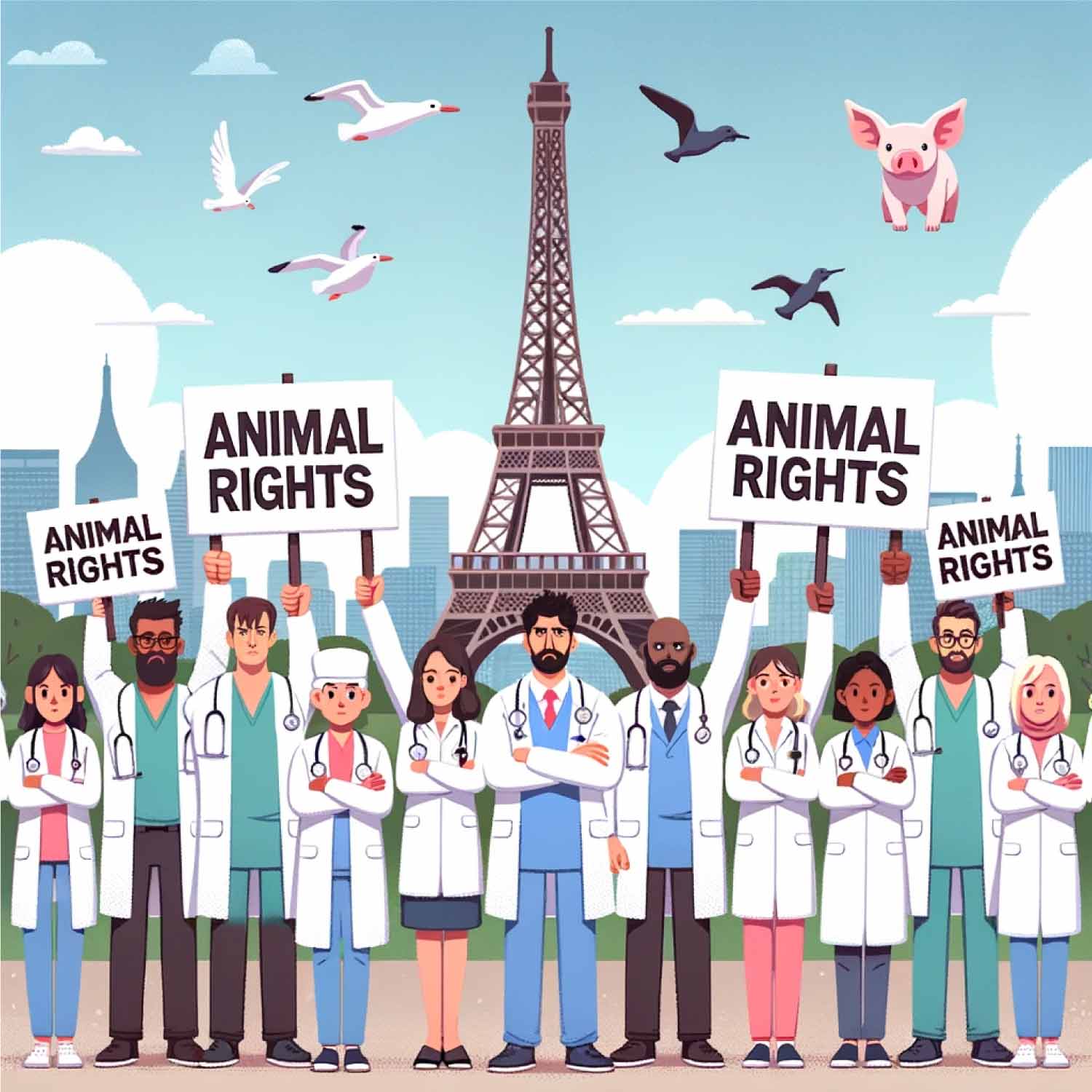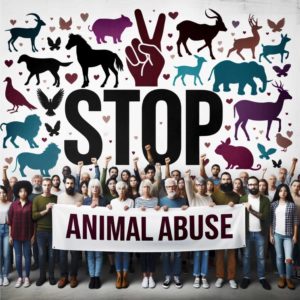
Animal protection is a subject close to the hearts of many people around the world. Animals, whether domestic, tamed wild or held in captivity, deserve respect, love and well-being. Unfortunately, they are sometimes victims of mistreatment, cruel and inhumane acts which arouse indignation and anger. These acts are not only immoral, but also have harmful consequences on the health and well-being of the animals involved.
Faced with this problem, many countries have put in place regulations to protect animals and punish perpetrators of mistreatment. France, a country known for its love of animals, is not left out. Indeed, since October 12, 2023, a significant update of the regulations has been carried out, thus strengthening the sanctions against those who mistreat animals. This new regulation demonstrates France’s continued commitment to guaranteeing the safety and well-being of all living beings.
In this article, we will explore in detail these new measures, their implications and how they strengthen the fight against animal abuse in France.
What is animal abuse?
Animal abuse is a complex and painful subject that arouses strong emotions. It manifests itself in different ways, ranging from passive neglect to acts of deliberate cruelty. Understanding the nature and extent of this abuse is essential to putting in place effective measures to prevent and combat it.
Definition and types of abuse:
Animal abuse is defined as any act or omission that causes harm, suffering or unnecessary stress to an animal. It can be intentional or the result of negligence. Here are some common types of abuse:
- Neglect: This is the lack of proper care, such as not providing enough food, water, shelter, or medical care to an animal.
- Physical violence: This includes beating, hitting, mutilating or killing an animal in a cruel manner.
- Abandonment: Leaving an animal unattended or in an environment where it cannot survive.
- Exploitation: Using animals for combat, testing, or painful experiments.
- Sexual abuse: Involves non-consensual and harmful sexual acts or activities inflicted upon animals for human gratification or entertainment, causing physical and emotional suffering to the animal. It is a form of cruelty and exploitation, often resulting in severe harm and trauma to the animal.
The impact of mistreatment on animal health and welfare:
Abuse has profound and lasting consequences on animals. Physically, they can suffer injury, illness, malnutrition or even death. Psychologically, abused animals may develop aggressive or fearful behaviors, anxiety, depression or other behavioral disorders.
Animals, like humans, feel pain, fear and distress. Abuse can rob them of the ability to lead normal lives, socialize with other animals, or reproduce. Additionally, abused animals can become dangerous to humans, as they may develop a distrust or fear of people.
The new sanctions in France
France has always been at the forefront of animal protection, constantly seeking to strengthen its laws to guarantee the well-being of our four-legged companions and other creatures. Recent updates to the regulations, in force since October 12, 2023, are further proof of this (here’s the link to the page). These new measures aim to deter and severely punish those who are guilty of mistreating animals.
The penalties incurred for sexual offenses against an animal:
Acts of sexual assault on an animal are now punished more severely. The culprits face a sentence of 3 years in prison and a fine of €45,000. These sanctions show to what extent these acts are considered serious and unacceptable.
Aggravating circumstances:
Certain situations make these actions even more reprehensible. If the sexual offenses are committed in a group, in the presence of a minor, or by the owner or guardian of the animal, the penalties are even heavier: 4 years in prison and a fine of €60,000.
Additional penalties:
Beyond the main penalties, the court may impose additional sanctions to ensure that the individual does not repeat his or her actions. These additional penalties may include a permanent ban on owning an animal. Furthermore, if the individual used his profession or social activity to commit these acts, he may be permanently prohibited from exercising this profession or activity.
Penalties for recording and disseminating images of sexual abuse of an animal:
In a digital age where sharing images is easy, it is crucial to punish those who record or distribute images of animal abuse. The voluntary recording of such images is considered an act of complicity, and the perpetrator faces the same penalties as the perpetrator of sexual offenses. In addition, the distribution of these images on the internet is punishable by 2 years in prison and a fine of €30,000.
How do I report a case of abuse?
Animal abuse, whether visible or hidden, is a reality that we cannot ignore. Faced with such a situation, it is crucial to know how to act and who to contact to put an end to the animal’s suffering and punish those responsible.
Procedures for reporting a case:
If you witness or suspect animal abuse, several options are available to you:
- The police or gendarmerie: In the event of an emergency or if the situation is obvious, it is recommended to immediately contact the police. They have the power to intervene quickly and take the necessary measures.
- The veterinary services of the DDPP (Departmental Directorate for Population Protection): These services are specially trained to assess the health and well-being of animals. They can intervene, carry out inspections and advise on the steps to follow.
- Animal protection associations: Many associations work for the protection of animals. By contacting them, you can benefit from their expertise, network and support in reporting and following up on the case.
The importance of the role of veterinarians:
Veterinarians play a vital role in detecting animal abuse. Through their training and experience, they can identify signs of neglect or abuse, whether physical or behavioral. Additionally, their position of trust allows them to educate and raise awareness among pet owners about good care practices.
If abuse is suspected, the veterinarian has not only the moral duty, but also the professional responsibility to report the case to the appropriate authorities. Their early intervention can make all the difference in the life of an abused animal.
The role of veterinarians in the face of animal abuse
Veterinarians, as guardians of animal health and welfare, are in a unique position to identify, prevent and respond to animal abuse. Their extensive training, practical experience and regular contact with animals and their owners give them particular responsibility in this area.
How can veterinarians help prevent abuse?
- Education and awareness: During consultations, veterinarians have the opportunity to educate pet owners on the specific needs of their companions, on good care practices and on behaviors to avoid.
- Proactive monitoring: During medical examinations, veterinarians can detect early signs of neglect or abuse, whether it be injuries, malnutrition or signs of stress.
- Advice on animal behavior: By helping owners understand their pets’ behavior, veterinarians can prevent situations that could lead to frustration or abuse.
- Collaboration with authorities: By establishing strong relationships with law enforcement and animal protection organizations, veterinarians can facilitate the reporting and intervention of proven abuse.
The importance of continuing education for veterinarians:
- Recognizing the signs: Animal abuse can manifest itself in a variety of ways. Continuing education allows veterinarians to stay up to date on the latest research and emerging signs of abuse.
- Reporting Procedures: Knowing the appropriate procedures for reporting a suspected case is essential to ensure a rapid and effective response. Regular training ensures that veterinarians are well informed of the procedures to follow.
- Handling delicate situations: Addressing the issue of abuse with a pet owner can be difficult. Training can help veterinarians handle these conversations tactfully and professionally.
Conclusion
Throughout this article, we have explored the severity and complexity of animal abuse, a topic that concerns us all as a society. From the definition of mistreatment and its impacts on the health and welfare of animals, to the new sanctions put in place in France to punish the guilty, including reporting procedures and the essential role of veterinarians, every aspect highlights the importance of protecting our voiceless companions.
Animal abuse is not only a reflection of individual cruelty, but also a symptom of a larger societal problem. Every act of neglect or cruelty toward an animal is a reminder of the need for continued education, awareness and action.
As individuals, we all have a role to play. Whether you are a veterinarian, pet owner, or simply a concerned citizen, your vigilance, compassion, and action can make all the difference. We must all remain attentive, informed and ready to act to ensure that every animal receives the respect, love and care they deserve.
In the face of animal abuse, inaction is not an option. Together, we can, and must, make our world a safer and more caring place for all living beings.
Animal abuse FAQ
What is animal abuse? Animal abuse includes any act or omission that causes harm, suffering or unnecessary stress to an animal. This may be intentional or the result of negligence.
What are the new sanctions in France regarding animal abuse? Since October 12, 2023, sexual offenses against an animal are punishable by 3 years in prison and a fine of €45,000. Aggravating circumstances can increase these penalties.
How can I report a case of animal abuse? You can report a case to the police, the gendarmerie, the veterinary services of the DDPP or an animal protection association.
What is the role of veterinarians in the face of animal abuse? Veterinarians play a crucial role in detecting animal abuse. They can educate owners, detect signs of neglect or abuse, and report suspected cases to the appropriate authorities.
What are the consequences of mistreatment on animal health? Abused animals can suffer injuries, illnesses, malnutrition or behavioral problems. They may also develop aggressive or fearful behaviors.
How can I help prevent animal abuse? Be vigilant, educate yourself and raise awareness among those around you. If you witness abuse, do not hesitate to report it. Also adopt animals from shelters and support animal protection associations.
Are images of sexual abuse of an animal legal? No, the recording and distribution of such images is illegal in France and is punishable by severe penalties.
What additional penalties are possible in the event of animal abuse? They may include a ban on keeping an animal or carrying out a professional or social activity linked to animals.
Why is continuing education important for veterinarians? It allows veterinarians to stay up to date on the latest research, signs of abuse and reporting procedures.
How can I ensure that my pet is well treated by a pet sitter or boarder? Find out about the establishment, read the reviews, ask questions and, if possible, visit the establishments places before entrusting your animal.

